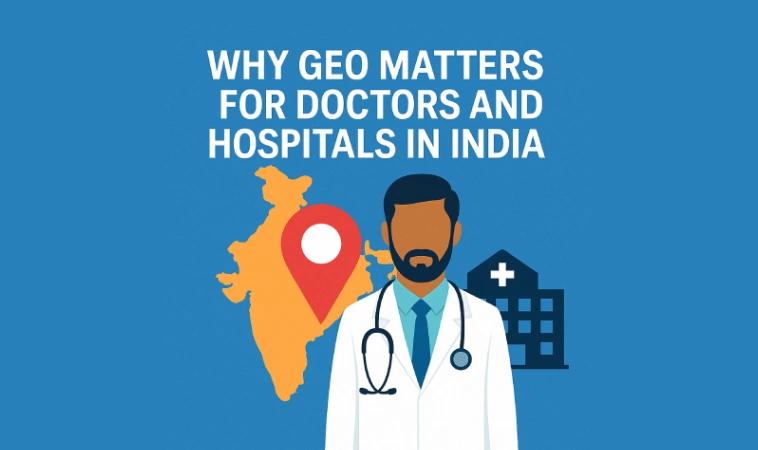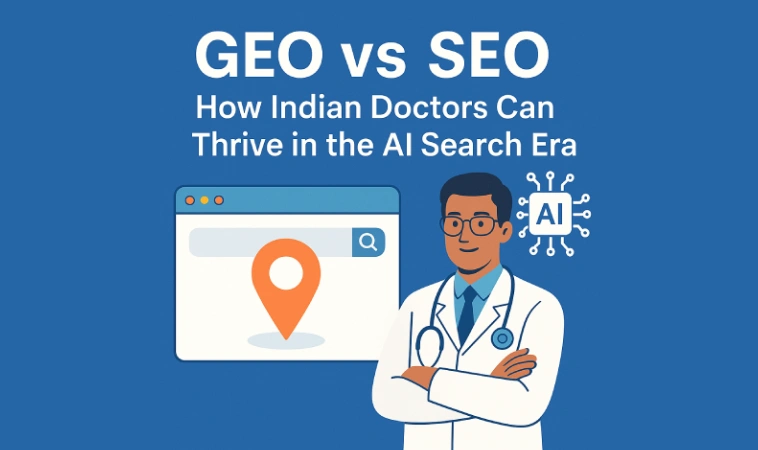The world of search is changing. Traditional SEO (Search Engine Optimization) – built on stuffing keywords and chasing Google rankings – is quickly becoming outdated. A new frontier has emerged: GEO (Generative Engine Optimisation). With the rise of AI-driven search tools like ChatGPT, Google’s Gemini, and Perplexity, consumers now get direct answers from AI instead of a list of links. Even Google’s own search is integrating AI-generated summaries alongside traditional results. In this AI-powered era, doctors and hospitals in India must adapt their digital strategy. GEO is the strategy that can keep your practice visible when patients ask AI for health advice. This blog will explain what GEO is, why it matters for Indian healthcare providers, and how you can start using it to grow your digital presence.
From Keywords to Context: Why Traditional SEO Is Fading
Not long ago, success online meant sprinkling the right keywords on your website and hoping to rank #1 on Google. But search behavior and algorithms have evolved. Google has moved from keyword matching to understanding context and intent. As one content strategist noted, Google trained us to search with choppy keywords, but now Google’s AI welcomes natural, conversational questions. In practice, that means a page full of repetitive keywords isn’t enough – your content must directly answer the specific questions people are asking. Research confirms this shift: marketers need to “shift from keyword optimization to answering real questions” to win in the AI search era.
Why is keyword-based SEO losing ground? AI-powered search engines are getting better at understanding language and context. They seek the best answers, not just the best keyword-stuffed pages. In fact, a recent analysis of 25,000 searches found that an AI will only use your page if it provides a precise, relevant answer to the user’s query – even if your page ranks #1 on Google. In other words, being a top Google result isn’t enough if the content doesn’t satisfy the question. Google’s own updates reflect this change too. The August 2024 core update, for example, aimed to show more “genuinely useful” content and less material “made just to perform well on Search. Simply put, the old tricks of SEO are no longer a sure recipe for visibility.
What is Generative Engine Optimisation (GEO)?
GEO is the new SEO for the age of AI. Generative Engine Optimisation is a strategy to ensure your practice is visible when patients use AI-powered search tools. Unlike traditional SEO which focuses on getting your website to rank in search results, GEO focuses on shaping what generative AI engines say about you . It’s about optimizing your online content and presence so that AI platforms (like ChatGPT, Gemini, Perplexity, or other “answer engines”) reference your information when delivering answers.
Think of it this way: SEO helps you rank on a Google results page, whereas GEO helps you get mentioned in an AI’s answer. Each requires a different approach. Traditional SEO still matters for getting into the top results, but GEO is about influencing AI-generated content and ensuring the AI’s answers include your practice. For example, if a patient asks an AI, “What’s the best skin clinic in Mumbai?”, GEO strategies increase the chances that the AI will mention your clinic as part of the answer. You can’t “force” an AI to Recommend you (just like you can’t force Google to rank you first), but you can take steps to influence the
AI’s output in your favor. GEO involves providing high-quality, context-rich information about your practice everywhere online – from your website and blogs to your profiles on medical platforms – so that the AI has trustworthy material to draw from when answering questions.
Why GEO Matters for Doctors and Hospitals in India

Patients today are tech-savvy. Many Indians – especially in cities like Mumbai, Delhi, and Bangalore – are experimenting with AI assistants and voice search for health queries. They might ask Perplexity or Siri’s AI, “I have persistent knee pain, should I see an orthopaedic doctor?” or “Who is the best cardiologist in Mumbai?” Instead of showing a list of 10 blue links, an AI-powered engine will try to give a single, curated answer. If your name or hospital isn’t part of that answer, you essentially don’t exist to that patient. This is why GEO is critical.
Generative AI search doesn’t just consider web pages – it considers context and credibility. Especially for healthcare (a sensitive “Your Money or Your Life” category), AIs like Google’s Search Generative Experience (SGE) heavily favor trusted, authoritative sources. One analysis showed that 72% of AI-generated answers in medical searches came from authoritative medical research centers. That means as a doctor or clinic, you need to demonstrate authority and trustworthiness online to get a slice of that visibility. Google and other platforms measure authority through things like the quali ty of your content, your credentials, citations, and how people engage with your information. In Google’s terms, it looks for E-E-A-T: Experience,
Expertise, Authoritativeness, and Trustworthiness . If your digital content shows that you are an experienced, credible expert – for instance, a cardiologist with 20 years of experience and a lot of patient education content – you’re more likely to be referenced by an AI’s answer engine. Generative AI engines favor authoritative and trustworthy sources, so demonstrating E-E-A-T in your content is key.
Context is king in the AI era. Rather than just matching a keyword like “diabetes doctor,” an AI will look at the context: Does your online profile clearly state your specialization in diabetes care? Have you written articles or answered questions about managing diabetes? Are you associated with reputable institutions? All these contextual signals help the AI determine if you are a good “answer” to the user’s query. For example, Google’s AI search can now provide local insights: it might suggest “Dr. XYZ at ABC Hospital in Mumbai for knee pain” if it has enough context about Dr. XYZ’s expertise and location. Generative search can guide users to local specialists by using AI-powered insights on location and expertise . You want to ensure that your practice is among those suggestions when the AI is figuring out which doctor in your city to mention.
Lastly, user behavior is shifting. While Google search isn’t going away (and still gets billions of queries), a growing segment of users are trying things like voice search and AI chatbots for quick answers. Busy professionals in Mumbai might ask their Google Assistant for a “top dentist nearby” while driving, or a young parent might consult an AI chatbot at midnight about a child’s fever. In these moments, they may not scroll through websites at all – they’ll trust the answer given. If that answer comes from an AI, you want your name or content to be part of it. GEO is how you ensure your visibility in these new channels of search.
GEO in Action: How to Prepare Your Digital Presence
The good news is that embracing GEO doesn’t require magic – it requires strategy. Google itself has stated that there’s nothing radically new you must do for AI results if you already focus on quality. In other words, the best practices of modern SEO overlap with GEO. The key difference is a shift in mindset: from targeting keywords to cultivating context and quality. Here are actionable steps for doctors and healthcare businesses to get started:
- Provide Direct Answers to Patient Questions: Make a list of common questions patients ask in your domain. For example, “How is arthritis treated?” or “What are the risks of heart surgery?” Ensure you have clear, accurate answers to these on your website or blog. Write in a conversational, plain language tone. AI engines pull from content that is easy to understand. If your orthopedic clinic has a blog post titled “5 Ways to Treat Knee Arthritis” that directly answers this question concisely, an AI is more likely to quote or cite it than a page that just generically mentions “knee pain” without details. Remember: Focus on answers, not keywords. One expert put it simply – AI search wants the “best answer,” not just the biggest page. So update your content to be precise and to the point in addressing patient queries.
- Optimize Your Profiles and Structured Data: Ensure that your practice’s details are complete and consistent across the web. This includes your Google Business Profile, hospital directory listings, and your website’s “About” page. Fill out all the fields – services offered, specializations, address, years of experience, awards, education, etc. This comprehensive information forms a structured profile of your practice online. Also, implement schema markup (structured data) on your website – for example, use healthcare-specific schema tags (like Physician, MedicalClinic, FAQ schema for common questions). This helps search engines and AI understand the context of who you are and what you do. As a result, the AI can more confidently include that info in its answers. Schema markup essentially helps Google interpret your pages and determine if they match a user’s intent. For instance, schema can highlight that “Dr. ABC is an Orthopedic Surgeon at XYZ Hospital in Mumbai with 15 years of experience,” making it easier for an AI to pick that up as a trustworthy fact.
- Build Authoritativeness through Content and Citations: In medical marketing, content is not just for SEO – it’s for establishing authority. Publish articles or brief posts on topics in your specialty, and make sure to back them up with credible sources or your own expertise. If you’re a dermatologist, a well-researched post about “safe skin treatments for the Indian climate” with your expert insights will build your authority. Over time, as multiple reputable sites or profiles mention you (for example, if you guest write an article on a health portal, or get cited in the news), the AI will associate your name with expertise. Generative AI thrives on cross-verified information – if the same fact (like your specialization or a quote from you) appears across many reliable places, it will trust it. On your own site, don’t be shy to highlight credentials, patient testimonials, and case studies. Show that you have real experience and trust in your field. Both Google and patients need those trust signals.
- Encourage and Manage Patient Reviews: For local searches, especially, reviews matter. Make it easy for satisfied patients to leave reviews on Google, Practo, Facebook, etc. Quantity and quality of reviews can influence your prominence. An AI answer to “best pediatrician in Mumbai” might incorporate top-reviewed pediatricians or at least draw from the same data that produces Google’s local results. While you can’t control what patients say, you can gently remind happy patients to share feedback. Respond to reviews professionally. A stream of positive, authentic reviews not only boosts your SEO, but also provides fresh content and trust indicators that AI can pick up on.
- Stay Active and Engaged Online: Maintain an active blog or a Q&A section on your site where you periodically address trending health questions or news (e.g., a new vaccine, a seasonal illness spike, etc.). Being up-to-date signals that your practice is engaged and relevant. Also, engage on social media or professional platforms – while social media signals are indirect for SEO, they do help in overall online presence. If your clinic’s Facebook page shares health tips regularly, and people engage, it’s building a digital footprint of expertise. If an AI finds multiple touchpoints of credible content from you (website, profiles, social posts, videos), it reinforces that you’re an authority worth mentioning.
- Monitor AI Search Results: Just as you might Google yourself to see your SEO standings, start checking AI engines. Try queries on Perplexity or Bing’s AI chat related to your specialty (“cardiologists in Mumbai” or “Dr. [Your Name] reviews”). See if and how you appear. This can give insight – for instance, if the AI mentions a competitor but not you, check what they have that you don’t (perhaps a stronger web profile or more content on a specific topic). Tools and AI search trends are evolving, but keeping an eye out will help you adjust your strategy. If you find misinformation in AI results about your field, consider publishing clarifications on your site – AI will often pull corrected info if it’s clearly available from you.
How ADoctor.in Helps You Embrace GEO
As a busy medical professional, all this talk of AI, schema, and content might sound overwhelming. That’s where ADoctor.in comes in. We are a digital marketing company in Mumbai dedicated to doctors and hospitals – and we’re already riding the GEO wave for our clients. Our team of young and dynamic professionals includes experts in marketing and medicine, so we understand both the tech side and the healthcare side of digital growth . Here’s how we support you in the GEO era:
- GEO-Focused Strategy: We don’t just do generic SEO; we tailor strategies for Generative Engine Optimisation. That means we research the kind of questions patients are asking AI about your specialty and ensure your content provides the best answers. We stay updated on the latest trends –from Google’s AI updates to new platforms like Gemini – so that your online presence is always a step ahead. Our approach is backed by the latest data and guidelines from Google and industry research, so you won’t fall prey to outdated tactics.
- Content that Builds Trust: Our content team helps you create blogs, articles, and profile content that highlight your expertise in simple language (an Ogilvy-style clarity). We ensure every piece is optimized for E-E-A-T: showcasing your experience and authority while being easy to read. Whether it’s writing a detailed treatment guide or a quick tip post, we make sure it’s fact-checked, valuable, and in line with what AI search prefers (clear answers with context). This not only boosts your chances with AI, but also impresses human readers, building your reputation.
- Structured Data and Profile Management: We take care of the technical under-the-hood optimisation too. Our team will implement the proper schema markup on your site (so search engines see all your key info structured), manage your Google Business profile, and update your listings on important medical directories. We ensure your “digital profile” is comprehensive and consistent everywhere. So when an AI or a Google algorithm scans the web for information about you, it finds a rich, structured set of data that we’ve carefully curated. This reduces the chance of AI picking up incorrect or incomplete information.
- Continuous Monitoring and Adaptation: Digital trends shift quickly. ADoctor keeps an eye on your SEO metrics and he emerging GEO metrics (like how often you are cited by AI results, which will be increasingly trackable). We provide you with reports and insights – for example, how a recent Google update might have affected your site traffic, or how a new AI feature could create an opportunity for you. Our goal is to adapt your strategy continuously so you maintain strong visibility. When you partner with us, it’s like having a digital marketing department that is fluent in healthcare and up-to-date with AI search innovations.
- Actionable Guidance: Beyond doing it for you, we also guide you and your staff on simple practices – like how to encourage reviews ethically, topics you might talk about in a short video, or how to handle patient inquiries coming from online channels. We believe in empowering our clients. In this new era, a proactive and educated client combined with our expertise is a winning formula.
Conclusion
The era of relying solely on keywords to drive patients to your clinic is ending. As search shifts from typed queries to AI-driven conversations, Generative Engine Optimisation is emerging as the essential strategy for digital growth. For doctors and hospitals in India, this is actually good news: it means that by sharing your expertise and maintaining a quality online presence, you can gain visibility in ways that go beyond the old SEO formulas. GEO is about being the answer rather than just appearing below the answer box. When a prospective patient in Mumbai asks an AI-powered engine about a health concern or a provider, you want to be featured in that rich generative result. By focusing on context, quality, and credibility – and by leveraging partners like ADoctor.in who understand these nuances – you can ensure that you thrive in the AI search era. The frontier of search is here. Doctors who embrace GEO early will not only stay visible, they will also build deeper trust with the digital audience. It’s time to go beyond SEO and adopt the new “prescription” for online success. Your future patients (and their AI assistants) are waiting for you to show up with the answers.
References: Latest Google and industry updates underscore this shift. Google’s Search Liaison team has reiterated that useful, people-first content is central to success. AI search trends show Google’s AIdriven answers are now present in about 25% of long queries (8+ words) – a number set to grow. Studies indicate that while top Google rankings give you a head-start, it’s the focused answers and authoritative context that determine if you get picked up by AI. In short, keyword-centric SEO is giving way to context-rich GEO. Doctors who recognize this and adapt will convert more searches into consultations. The tools may be getting smarter, but the principle remains: help the patient, online or offline. GEO is simply how we make sure that help gets found in 2025 and beyond.

